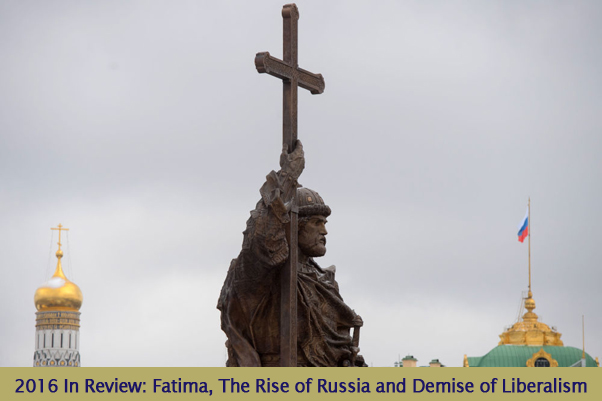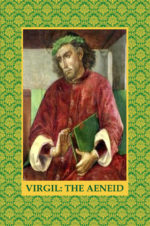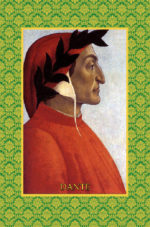2016 HAS BEEN A HIGHLY UNUSUAL AND TUMULTUOUS YEAR, a year marked by increased terror and unexpected turn of events, a year in which a decade of US foreign policy blunders became manifestly apparent as one by one countries around the globe stood up and began to break the shackles of neoliberalism foisted upon them for decades, a year which saw the collapse of Global Liberal Hegemony accompanied by the unexpected rise of Russia to global prominence and their subsequent renunciation by Western media. Russia is now the enemy, not because they are Communist, but because they are reasserting their Christian identity and consequently opposing rampant liberalism. This change came as a surprise to many, forcing leading intelligence agencies such as Stratfor to significantly alter their intelligence forecasts about Russia bringing them into alignment with what New Era has consistently forecast all along.
At the end of 2015 Stratfor projected a gloomy future for Russia, whom it predicted was in a state of imminent collapse
In Feb of 2015 the intelligence group insisted:
“It is unlikely that the Russian Federation will survive in its current form. Russia’s failure to transform its energy revenue into a self-sustaining economy makes it vulnerable to price fluctuations. It has no defense against these market forces.”
” Russia, the declining power, will increasingly lose the ability to protect its maritime interests.
As late as October, 2016 Stratfor concluded:
“10 years ago… Russia was clearly at the height of a boom, rebuilding itself into a stable and robust power. Today, the country is quickly descending into the next, less pleasant stage. The strategy that revitalized the country is becoming less effective…. Though still assertive, Russia is no longer acting from a position of strength.”
“This is not to say Russia is on the brink of collapse, only that the country is entering the next phase of its historical cycle, in which the state is highly vulnerable yet increasingly aggressive. Putin will therefore be acting from a position of survival instead of strength.”
“Though we forecast the decline of Russia, Russia poses danger in the short term, particularly with its back against the wall economically.”
Stratfor made an Interesting about face in its most recent Annual Report in which it forecasts a reemergence of Russia rather than an imminent collapse. According to the December 26, 2016 report:
“2017 could herald a new phase for Russia’s standoff with the West.”
In the past three years Russia has expanded its domestic production and consumption and weathered the battery of sanctions meant to cripple its economy; it has also placed its military and technological capabilities on international display. By referendum vote it acquired Crimea and the countries of Bulgaria, Moldova, and the contiguous region of Transnistria have indicated a rapprochement toward Russia and away from NATO and the EU.
Due to the rise of patriotic parties throughout Europe, parties favoring restoration of traditional family-oriented and Christian values, Europe faces the prospect of fragmentation as nation after nation reasserts its national identity and raises its voice against liberalism. Thus, Stratfor notes that 2017 could be the harbinger of a neoteric chapter in Russian-Western relations.
“Mounting tensions have exposed cracks in the united Western front against Russia. The Brexit vote revealed deep rifts in the European Union, and Donald Trump’s victory in the U.S. presidential election may portend a break in Washington’s policy toward Moscow.”
Stratfor correctly notes that
“Elections across Europe in 2017 — in France, the Netherlands, Germany and possibly Italy — could further widen the divides in the Continental bloc and challenge the future of European integration.”
Moreover, recent success in Syria should help Russia in negotiations with the new Trump administration and with newly elected political leaders throughout Europe.
“These changes will enable Russia to recoup some of its influence in the former Soviet periphery. Given the upheaval in the European Union, the bloc (EU) will be hesitant to move forward with proceedings to accede new members in 2017.”
In addition, countries of the former Soviet Union that are “already aligned” with Moscow (Armenia, Belarus, Kazakhstan, Kyrgyzstan and Tajikistan) “will probably redouble their cooperation with Russia in the coming year,” and the Eurasian Economic Union and the Collective Security Treaty Organization “could become more active in 2017 after languishing over the past two years.”
President Vladimir Putin delivered his Annual Address to Russian Federal Assembly (December 1, 2016) in which he highlighted the health of the nation in the face of the global regime arrayed against it. Speaking about liberalism and attempts to erode traditional and family values in Russia, Putin stated:
“The people of Russia have shown convincingly once again that they can rise to the difficult challenges and protect and defend their national interests, sovereignty, and independent course….We need friends. But we will not allow our interests to be infringed upon or ignored. We want to and will decide our destiny ourselves and build our present and future without others’ unasked for advice and prompting.”
“Two years ago…we found ourselves facing sanctions that were an attempt to get us to dance to another’s tune and ignore our own fundamental national interests.”
“Colleagues, the basis of our entire policy is to take care of people and increase human capital as Russia’s most important resource. Therefore, our efforts are aimed at supporting the traditional values and the family, at [implementing] demographic programmes, improving the environment and people’s health, and promoting education and culture.”
Linked to this these ends, Putin is determined to promote morality, which he has made one of the two primary goals of education. Speaking about education, he stated:
“School education meets two basic goals that Academician Dmitry Likhachev listed: to give knowledge and to foster morality. He rightly believed that morality is the basis that determines the viability of society: its economic, public, and creative sustainability.”
Shifting to the economy and attempts to cripple Russia by sanctions, Putin noted Russia’s sustainability and unexpected growth in the IT, agricultural, vehicle and machinery sectors. Russia, which is often presented as unable to feed its own people has passed the United States as the number one exporter of wheat in the world. Russia now exporting more grain than arms.
“Last season, Russian topped the U.S. in wheat exports for the first time in decades and is expected to extend those gains to displace the EU from the top spot this year, according to the U.S. Department of Agriculture. Investors from local farmers to billionaire tycoons are pumping money into the business.”
“Russian wheat has crowded out U.S. supplies in Egypt, the world’s biggest buyer, and is gaining footholds in some other countries, such as Nigeria, Bangladesh and Indonesia. That’s four decades after the Soviet Union turned to U.S. shipments of wheat and corn to offset shortfalls in its own harvests. Over the last decade, Russia has been the biggest single source of growth in wheat exports, vital to meeting surging global demand.”
Speaking about the other sectors experiencing growth, Putin stated:
“We have seen a slight overall decline in the automotive industry, although trucks have shown an increase of 14.7 percent, light commercial vehicles, up 2.9 percent, and buses, up 35.1 percent. In railway engineering, there is a 21.8 percent growth, and freight cars are up 26 percent. Agricultural machinery and equipment have shown very good momentum, 26.8 percent. The light industry is also demonstrating an upward trend.”
“We have ensured macroeconomic stability, which is very important, and have maintained financial reserves. The Central Bank gold and currency reserves have not decreased, but have even grown. Whereas on January 1, 2016 they totalled $368.39 billion, now they stand at $389.4, almost 400 billion. Here, too, we can see positive dynamics.”
“Agricultural produce exports bring in more revenue today than arms exports. Only recently, we would probably have scarcely imagined such a thing possible. I have already spoken publicly about this and can say it again here today. Incidentally, as far as our arms exports go, we are still a serious contender on this market. Our exports came to $14.5 billion in 2015, and our agricultural produce exports came to $16.2 billion. This year, we expect a figure of $16.9 billion.”
“The IT industry is one of the most rapidly developing sectors, which is heartening. Russian IT companies have doubled their exports over the past five years…. Our IT exports were almost zero only recently, but they have risen to $7 billion now.”
Putin also cited the growth of profitability in the banking sector
“This year, Russian banks have regained their profitability. The sector’s profit for the 10 months of last year was 193 billion rubles, and rose almost four-fold, to 714 billion rubles for the same period this year.”
He closed by noting by acknowledging that the sanctions have had an effect but that Russia is weathering the storm”
“While overcoming the current difficulties, we have created a foundation for further movement forward. We never stopped working on the development agenda, which is extremely important. That is, we did not get bogged down in some trivia of the day, like dealing with survival issues, but we thought about the development agenda and contributed to it. This agenda is coming to the forefront today.”
With elections of Euro-skeptic and pro-Russian candidates set to take place in France, Germany, England and perhaps Italy in 2017 coupled with changes underway in Poland, Slovakia, Hungary, Moldova and Bulgaria, as well as a Trump administration scheduled to assume the reigns of US power in January, 2017 could be a banner year for the Russians, quite a change from the imminent doom of the 2016 forecast. Russia’s unexpected successes in 2016 apparently nudged Stratfor to re-evaluate its projections, at least for the short-term.
The rise of Russia should not have been a surprise to anyone well versed in theopolitics, especially when the theopolitcal analysis involves a major political actor such as Russia as does a theopolitical analysis that includes the Message of Fatima. New Era Intelligence Reports have been focused Russia throughout the year as incident after incident pointed to the demise of global liberalism and the corollary conversion of Russia promised at Fatima.
Russia under Boris Yeltsin and Mikhail Gorbachev was a key player in the move toward globalism. With Russia on their side, liberal elites were certain to score a global victory, but much to their chagrin, Russia pulled away from the US and EU globalists. After March 25, 1984, when John Paul II made the consecration of the world to the Immaculate Heart of Mary, as requested at Fatima, an unexpected political and theological current began to push back against the tide of liberalism. When it became apparent that Russia was no longer a member of the globalist team, a relentless media campaign was launched against Putin. However, in Russia and then in other nations of Eastern Europe, Africa and Asia, and then Western Europe and even America change, sometimes almost imperceptible change, was occurring. By 2016 the Christian renewal in Russia and elsewhere became so obvious that only the most hardened hearts could deny the changes that were actually taking place in Russia under Vladimir Putin, the type of changes anathema to the liberal regime. These include, as Putin stated in his annual address, a reversion away from the liberal path, on which Gorbachev and Yeltsin had placed Russia, and a turn towards traditional family values and the renewal of Christianity in Russia. The fruits of this movement are listed on a Newera page entitled “Is Russia Becoming Christian, Decide for Yourself“. This list includes events such as declaring the Baptism of Prince St. Vladimir as the National Holiday of Russia, marking Her identity as a Christian nation; other fruits include the outlawing of homosexual propaganda aimed at minors, the introduction of Christianity into the public schools, prohibitions against abortion, and enforced defense of holy places such as Orthodox and Christian churches.
Russia is still in the ascendant mode and will remain in that mode until complimented and then surpassed by a resurgent Europe to be discussed at a later time in 2017. Today, this is the type of cultural event occurring on Red Square at the Kremlin (see video), the type of event anti-Christian globalists abhor and attempt to keep out of the news.
This is the Type of Cultural Event Putin is Sponsoring at the Kremlin
Fatima and the Russian Connection
When Our Lady appeared to Sister Lucia in the Convent of St. Dorothy in Tuy, Spain (June 13, 1929), she came with a message whose seeds she had planted during Her third visit of July, 13, 1917 when She told the three children about (1) World War II and the means to prevent it (2) the consecration of Russia to Her Immaculate Heart and (3) First Saturday Communions of Reparation. She told Lucia that God would provide a sigh that a new world war was ready to break out.
“When you see a night illuminated by an unknown light, know that this is the great sign given you by God that He is about to punish the world for its crimes, by means of war (World War II), famine, and persecutions against the Church and the Holy Father.
To prevent this, Our Lady told the children that sometime in the future She would come back to ask for the consecration of Russia to Her Immaculate Heart, and the Communion of Reparation on the First Saturdays.
“To prevent this, I shall come to ask for the consecration of Russia to My Immaculate Heart, and the Communion of Reparation on the First Saturdays.”
”If My requests are heeded, Russia will be converted, and there will be peace; if not, she will spread her errors throughout the world, causing wars and persecutions of the Church. The good will be martyred, the Holy Father will have much to suffer, various nations will be annihilated.
Nonetheless, Our Lady promised an end to all this and a definitive victory associated with Her Immaculate Heart:
”In the end, My Immaculate Heart will triumph. The Holy Father will consecrate Russia to Me, and she will be converted, and a period of peace will be granted to the world” (Fatima, July,1917).
Twelve years later when Our Lady appeared to Lucia at Tuy, (June 13, 1929) and announced the following, Lucia knew exactly what She was talking about:
“The moment has come in which God asks the Holy Father, in union with all the bishops of the world, to make the consecration of Russia to my Immaculate Heart, promising to save it by this means” (Tuy, 1929).
It took another 55 years for the consecration to be made on March 25, 1984. By that time the communists had spread their errors (atheism, materialism, socialism) around the world, so much so that the effects are still being felt today. It will take a long time to undo them, but anyone closely observing global events can tell that a change, a significant change, is underway in Russia and around the world. Russia’s unexpected conversion is throwing a monkey wrench into liberal foreign policy initiatives – the entire global system is being thrown off of kilter by what the Russians are doing; no one expected it. The liberal regime had expected Russia to be a player advancing the global agenda. Instead to everyone’s surprise, Russia has taken an about face and is reasserting its Christian identity.
TO BE CONTINUED
Tomorrow, New Era News will provide a a recap of 2016’s major political events highlighting the global shift away from liberalism and the emergence of Christianity assisted by the conversion of Russia..







